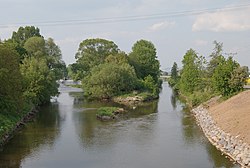Svratka (river)

| Svratka | |
|---|---|
 Confluence of the Svratka (left) and Svitava | |
 | |
| Location | |
| Country | Czech Republic |
| Regions | |
| Physical characteristics | |
| Source | |
| • location | Cikháj, Upper Svratka Highlands |
| • elevation | 772 m (2,533 ft) |
| Mouth | |
• location | Thaya |
• coordinates | 48°54′16″N 16°36′44″E / 48.90444°N 16.61222°E |
• elevation | 163 m (535 ft) |
| Length | 168.5 km (104.7 mi) |
| Basin size | 7,115.6 km2 (2,747.3 sq mi) |
| Discharge | |
| • average | 27.24 m3/s (962 cu ft/s) near estuary |
| Basin features | |
| Progression | Thaya→ Morava→ Danube→ Black Sea |
The Svratka (Czech pronunciation: [ˈsvratka]; German: Schwarzach) is a river in the Czech Republic, a left tributary of the Thaya River. It flows through the Vysočina and South Moravian regions, including the city of Brno. It is 168.5 km (104.7 mi) long, making it the 9th longest river in the Czech Republic.
Etymology
[edit]According to one theory, the name originates from the Proto-Slavic verb vort (vrátit in modern Czech), which meant "to return". It denoted "a returning river" (which meant meandering river). Another theory is that the name was derived from the Germanic Swarta, which meant "black water". Sometimes the river was colloquially referred to as Švarcava or Švorcava.[1]
Characteristic
[edit]
The Svratka originates in the territory of Cikháj in the Upper Svratka Highlands at an elevation of 772 m (2,533 ft) and flows to the Nové Mlýny reservoirs, where it enters the Thaya River in Dolní Věstonice at an elevation of 163 m (535 ft). It is 168.5 km (104.7 mi) long, making it the 9th longest river in the Czech Republic. Its drainage basin has an area of 7,115.6 km2 (2,747.3 sq mi).[2]
The longest tributaries of the Svratka are:[3]
| Tributary | Length (km) | River km | Side |
|---|---|---|---|
| Jihlava | 180.8 | 0.1 | right |
| Svitava | 98.4 | 40.7 | left |
| Bobrůvka | 62.6 | 78.9 | right |
| Litava | 58.6 | 29.0 | left |
| Bobrava | 37.6 | 36.8 | right |
| Bílý potok | 36.0 | 67.0 | right |
| Šatava | 32.0 | 9.9 | right |
| Nedvědička | 30.2 | 89.1 | right |
| Bystřice | 26.2 | 113.5 | right |
| Hodonínka | 24.4 | 103.0 | left |
| Lubě | 24.1 | 73.7 | left |
| Fryšávka | 23.8 | 125.5 | right |
Settlements
[edit]
The most notable settlement on the Svratka is the city of Brno, where the Svitava flows into the river. The river flows past the following municipalities: Cikháj, Herálec, Svratka, Křižánky, Březiny, Krásné, Spělkov, Telecí, Borovnice, Jimramov, Strachujov, Unčín, Dalečín, Chlum-Korouhvice, Vír, Koroužné, Štěpánov nad Svratkou, Ujčov, Nedvědice, Černvír, Doubravník, Borač, Štěpánovice, Tišnov, Veverská Bítýška, Brno, Modřice, Rajhrad, Židlochovice, Nosislav, Velké Němčice, Vranovice, Pouzdřany, Ivaň and Dolní Věstonice.
In the section from Březiny to Borovnice, the river forms the border between the Vysočina and Pardubice regions. In the section from Herálec to Jimramov, the river also forms the border between the historical lands of Bohemia and Moravia.
Bodies of water
[edit]The reservoirs Brno (259 ha (640 acres)), Vír I (224 ha (550 acres)) and Vír II (13 ha (32 acres)) are built on the Svratka. The largest body of water in the basin area is the Dalešice Reservoir with an area of 463 ha (1,140 acres), which is built on the Jihlava River. There are 4,942 bodies of water in the basin area.[2]
Economy
[edit]The Svratka is among the popular rivers for river tourism. Two of its sections are navigable; hovewer, the upper section is navigable only during the spring thaw and after heavy rains, and the lower section depends on the discharge of the Vír I and Vír II reservoirs. A short slalom channel is built between Vír I and Vír II.[4][5]
References
[edit]- ^ Svoboda, Jiří (2011-09-08). "O původu názvů českých řek" (in Czech). Archived from the original on 2020-10-25. Retrieved 2019-07-12.
- ^ a b "Základní charakteristiky toku Svratka a jeho povodí" (in Czech). T. G. Masaryk Water Research Institute. Retrieved 2023-09-19.
- ^ "Vodní toky". Evidence hlásných profilů (in Czech). Czech Hydrometeorological Institute. Retrieved 2024-10-18.
- ^ "Řeka Svratka" (in Czech). CzechTourism. Retrieved 2023-09-19.
- ^ "Svratka – řeka pro jarní nadšence i turisty" (in Czech). Pádler. 2017-11-10. Retrieved 2023-09-19.
External links
[edit]- River flow at Dalečín station – Flood Warning and Forecasting Service of the Czech Hydrometeorological Institute